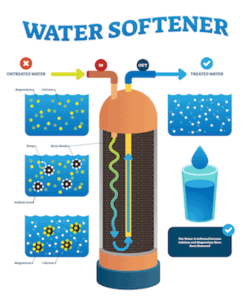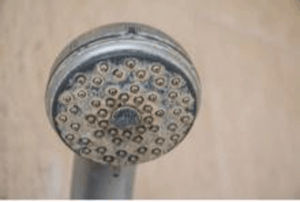How Does A Water Softener Work?
September 15, 2020
Today’s softening models typically use a process called ion exchange to remove mineral concentrations like calcium and magnesium from household water. By removing sedimentary mineral concentrations and replacing them with sodium ions, water softeners make your household water much easier on your skin, hair, plumbing, soap… and wallet!

Water softeners are often a wise investment because of how frustrating (not to mention expensive) hard water can be when you’re forced to rely on it. This is everything a homeowner should know about hard water, soft water, and how water softeners can help you:
What is Hard Water and Why Is It Harmful?
Hard vs soft water refers to the level of minerals in your water. Hard water contains a high concentration of calcium, magnesium, and other minerals. It is created when water travels through rock and soil with deposits of these natural occurring minerals. Small amounts of the minerals dissolve into the water and eventually travel to wells and homes.
Hard water isn’t poisonous to humans, but it can wreak havoc on plumbing, appliances, and clothing. The additional minerals lead to a scale build up that can clog pipes and corrode water heaters, sinks, dishwashers, and any other equipment that uses water. Hard water interferes with soap’s ability to lather requiring more soap and more effort to get clean. It can leave a slimy feeling film on your skin, hair, and clothing.
Water softeners are hard-wired into your home’s water supply to remove mineral content from your water. Softened water is gentler on your home and easier to wash with.
How Does a Water Softener Work?
The water softener charges minerals in hard water with positive ions, which are atoms with more protons than electrons. In order to remove these minerals from your water, a water softener uses negatively-charged ions (or atoms with more electrons than protons). The softener introduces these negative ions, which are called “anions,” via resin beads contained in the tank. beads are treated with a sodium brine solution.
Hard water enters your home and travels through a softener tank filled with negatively-charged resin beads. As the positively-charged minerals in the water supply pass through the tank, they’re attracted to the negatively-charged beads. When the minerals move toward the beads, they move out of the water. Sodium moves in to fill in the gap they leave behind instead. The resulting softened water exits the tank into your home water supply. The entire process is called ion exchange, because it exchanges calcium and magnesium ions for sodium ions.
Occasionally, the beads in the tank need to recharge their anions before being able to perform another cycle. A sensor in the water softener monitors the ion levels and initiates a regeneration cycle. During this cycle, the mineral buildup on the beads is flushed away and sodium chloride (or whichever salt you use) is released from a brine tank to provide fresh anions.
Are Water Softeners Safe?
Yes, The ion exchange process is perfectly safe and healthy for your family.
Even though your water softener adds salt to your water, don’t worry: the water won’t have a salty taste. You are drinking sodium (Na) in small, safe amounts–not table salt (NaCl). The amount of sodium water softeners add to your water is about 12.5 milligrams, which is less than you’d find in most foods and falls well below FDA guidelines.
If you’re on a low sodium diet, you can substitute potassium chloride pellets in your softener. If you’re concerned about the taste of your water, try adding a filtration system such as a reverse osmosis filter to improve the flavor.
Do I Need A Water Softener in My Home?
From clearing up spotted glassware to preventing clogged pipes, there are all kinds of reasons to install a water softener in your home. Here are a few signs that your water may be too hard:
- Limescale buildup. The higher concentration of magnesium and calcium ions in hard water may leave a noticeable chalky residue in your sinks, dishwasher, washing machine, and other appliances. This buildup is especially detrimental to hot water heaters, where it can create clogs and shorten lifespan and efficiency.

- Dry skin and dry hair. Hard water in your shower can leave you feeling dried out. The higher mineral concentration creates a film that gets on your hair and skin and blocks your pores. Hard water also prevents soap from properly lathering, which compromises your ability to truly clean.
- Frequent plumbing repairs. Expenses from hard water add up. Pipes corrode more quickly, leading to blocked plumbing, grimy faucets, and low water pressure.
- Gray or faded laundry. Do your linens look off-color or feel stiff or crusty? Hard water is tough on laundry. It inhibits detergents from doing their job properly and leads to buildup that, over time, can change the color and texture of your clothing.
- Spotted glassware. This is the classic tell-tale sign of mineral-heavy water. If you’re tired of seeing spots whenever you sit down to eat or pour a glass of cabernet, it may be time for a softener.
Water hardness is measured in “grains per gallon” of mineral content. If you suspect your water is too hard, you can buy a simple test kit to measure this yourself. You can also drop a sample with a lab or have a professional test it for you.
Is Water in the Dallas Area Hard?
It may depend on the source of your water. Six different water sources serve the Dallas area. Each of these sources has their own characteristics and mineral compositions. A 2000 comprehensive report on water quality and treatment called Dallas area water “moderately hard” overall.
Knowing the quality of your water and keeping your family healthy is a big piece of any plumbing decision. We can help with that.
How Long Do Water Softeners Last?
Water softeners are a good investment in that they typically last 20 years. Choosing a quality water softener and installing and maintaining it properly can extend its lifespan beyond the 20 year expectation.
Here are a few simple ways to get the most out of your water softener:
- Optimize the settings for your specific water.
- Set your regeneration cycle to meet your home’s needs.
- Choose a softener that meets your capacity needs.
- Use quality salt or potassium chloride when you refill the softener.
- Have your system periodically cleaned.
Maintaining your water softener isn’t a big job. A little prevention and intervention will ensure that your water has the right mineral balance for your home.
Get the Best Plumbing Solutions for Your Dallas Texas Home
For prompt service and answers to your questions about water hardness and any other plumbing concern, you can trust Ben Franklin Plumbing. One of our professional technicians will happily check your home’s water and offer real solutions to all of your plumbing problems. Give us a call at (972) 895-7775!